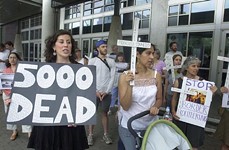UT and VA Combine Forces to Study Brain Trauma in Iraq Vets
UT’s J.J. Pickle Research Campus will conduct state-of-the-art brain imaging research on combat soldiers.
By Andrea Grimes, 2:10PM, Thu. Jan. 17, 2008
Lucky us: It looks like Austin’s a pretty good place to have a head injury.
At an open house at UT’s J.J. Pickle Research Campus in North Austin this morning, officials announced plans to conduct brain imaging research on combat soldiers in hopes of better understanding traumatic brain injury (TBI) and one of its most debilitating resulting conditions: post-traumatic stress disorder (PTSD). They’ll be using a state-of-the-art brain scanner and $4.2 million in funding from the U.S. Department of Veterans Affairs to address a growing population of veterans surviving the wars in Iraq and Afghanistan with brain injuries.
“There’s a lot more art than science” in modern rehabilitation methods, said UT’s brain imaging lab director, Dr. Robert Van Boven, in a keynote address to a roomful of men and women in uniform, doctors, and others who came out to avail themselves of the tasty breakfast buffet at the research center’s wooded campus. The VA and UT hope to combine scientific research with qualitative methods like psychoanalysis to determine new, more effective treatments for soldiers returning from war with brain trauma.
Of 1.6 million deployed troops, there may be as many as 150,000 who ultimately suffer brain trauma, according Dr.Van Boven, who consulted with the Center for Disease Control for the estimate. (A “How To Prevent Brain Injury” fact sheet distributed at the event touting the benefits of the helmet + bicycle combo left out one key piece of advice for those seeking to keep their noggins intact: maybe don’t sign up for the Army.)
The imaging lab at UT is remarkable because of the methods its researches will combine to create images of the brain. Blood flow to the brain is tracked via function magnetic resonance imaging, then magnetic resonance spectroscopy measures chemicals in the brain and diffusion tensor imaging tracks water movement in the brain, all while volunteer subjects are stimulated by images, objects, and sounds.
The 150 servicemen and women who have volunteered for the study are all first-time combat soldiers. Their brains and behavior will be analyzed before and after deployment to track the effects of trauma.
Senator John Cornyn attended the open house and closed out the event with a speech about “Great Americans,” “heroes,” “pride,” “God,” “blessings,” “service,” “honor,” “dignity,” etc.
Got something to say on the subject? Send a letter to the editor.
A note to readers: Bold and uncensored, The Austin Chronicle has been Austin’s independent news source for over 40 years, expressing the community’s political and environmental concerns and supporting its active cultural scene. Now more than ever, we need your support to continue supplying Austin with independent, free press. If real news is important to you, please consider making a donation of $5, $10 or whatever you can afford, to help keep our journalism on stands.
Brain Injury Treatment, brain injury, brain injuries, combat injuries, UT, brain injury research, J.J. Pickle Research Campus








